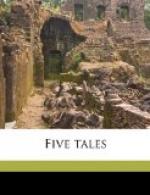“Would you like me to stay?”
“Yes.”
“I’m going to say a prayer for you to-night!”
She flushed crimson, frowned, and went out of the room. He sat, cursing himself, till his tea was stewed. It was as if he had hacked with his thick boots at a clump of bluebells. Why had he said such a silly thing? Was he just a towny college ass like Robert Garton, as far from understanding this girl?
Ashurst spent the next week confirming the restoration of his leg, by exploration of the country within easy reach. Spring was a revelation to him this year. In a kind of intoxication he would watch the pink-white buds of some backward beech tree sprayed up in the sunlight against the deep blue sky, or the trunks and limbs of the few Scotch firs, tawny in violent light, or again, on the moor, the gale-bent larches which had such a look of life when the wind streamed in their young green, above the rusty black underboughs. Or he would lie on the banks, gazing at the clusters of dog-violets, or up in the dead bracken, fingering the pink, transparent buds of the dewberry, while the cuckoos called and yafes laughed, or a lark, from very high, dripped its beads of song. It was certainly different from any spring he had ever known, for spring was within him, not without. In the daytime he hardly saw the family; and when Megan brought in his meals she always seemed too busy in the house or among the young things in the yard to stay talking long. But in the evenings he installed himself in the window seat in the kitchen, smoking and chatting with the lame man Jim, or Mrs. Narracombe, while the girl sewed, or moved about, clearing the supper things away. And sometimes, with the sensation a cat must feel when it purrs, he would become conscious that Megan’s eyes—those dew-grey eyes—were fixed on him with a sort of lingering soft look which was strangely flattering.
It was on Sunday week in the evening, when he was lying in the orchard listening to a blackbird and composing a love poem, that he heard the gate swing to, and saw the girl come running among the trees, with the red-cheeked, stolid Joe in swift pursuit. About twenty yards away the chase ended, and the two stood fronting each other, not noticing the stranger in the grass—the boy pressing on, the girl fending him off. Ashurst could see her face, angry, disturbed; and the youth’s—who would have thought that red-faced yokel could look so distraught! And painfully affected by that sight, he jumped up. They saw him then. Megan dropped her hands, and shrank behind a tree trunk; the boy gave an angry grunt, rushed at the bank, scrambled over and vanished. Ashurst went slowly up to her. She was standing quite still, biting her lip-very pretty, with her fine, dark hair blown loose about her face, and her eyes cast down.
“I beg your pardon,” he said.
She gave him one upward look, from eyes much dilated; then, catching her breath, turned away. Ashurst followed.




